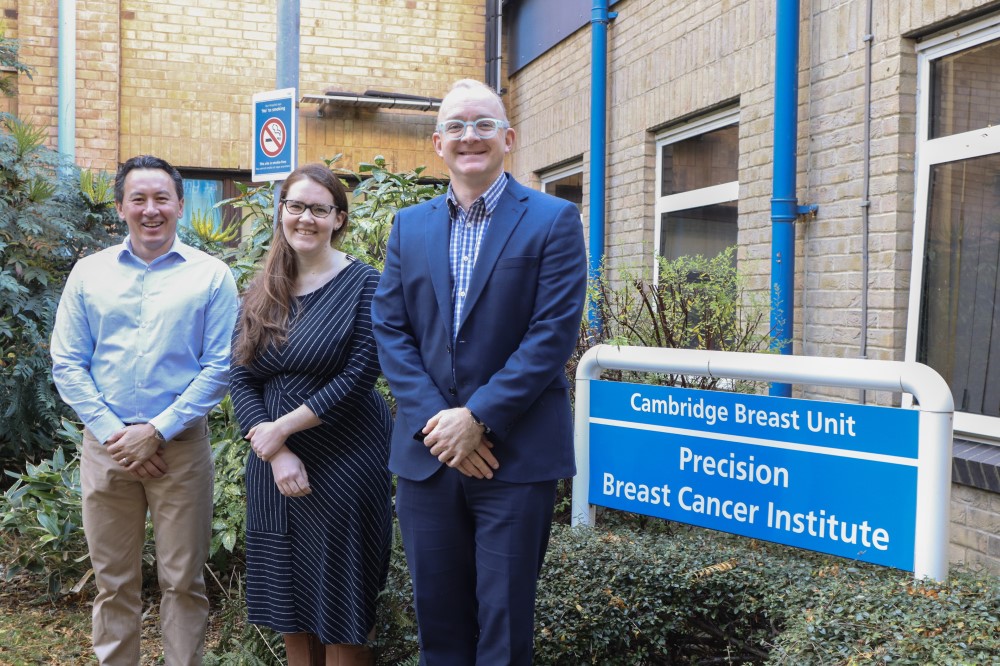
The results show that either a high or low dose of megestrol when given with the standard hormone therapy, letrozole, could be more effective in stopping tumour growth than letrozole alone.
These findings will need to be confirmed in larger trials before the treatment is routinely available.
The PIONEER trial of nearly 200 post-menopausal women diagnosed with early-stage ER positive breast cancer compared giving a mimic of the hormone progesterone, called megestrol acetate, in combination with standard hormone therapy, called letrozole, with standard hormone therapy alone.
Megestrol is a readily available treatment taken as a daily tablet and has already been shown to reduce side effects of standard hormone therapy such as severe hot flushes and sweats, when given at low dose.
Dr Rebecca Burrell, who is the lead oncology trainee for PIONEER at Addenbrooke’s Hospital, presented the first results of the trial at the San Antonio Breast Cancer Conference, the largest global gathering of breast cancer researchers and clinicians.Trial Chief Investigator Dr Richard Baird, consultant oncologist at Addenbrooke’s Hospital and a member of the Cancer Research UK Cambridge Centre’s Precision Breast Cancer Institute, said:
“We are excited that the PIONEER trial results suggest that adding low-cost megestrol to standard hormone therapy could make it work better and help with side effects.”Bench to bedside
The idea for the trial originated from research led by Prof Jason Carroll, Senior Group Leader at the Cancer Research UK Cambridge Institute.
When breast cancer cells have high levels of the molecule known as oestrogen receptor (ER), it means that the hormone oestrogen fuels the cancer cells to keep growing and dividing. This type of cancer is called ER positive breast cancer.
About 75% of breast cancer cases are ER positive. It is treated with an anti-oestrogen hormone therapy, such as letrozole, to prevent cancer cells responding to oestrogen, thereby slowing tumour growth.
Some breast cancer patients also have high levels of another molecule, known as progesterone receptor (PR), and this group of patients also respond better to the anti-oestrogen hormone therapy.
In order to find out why, Prof Carroll’s team carried out experiments on cancer cells in the lab and discovered that the hormone progesterone stops ER positive cancer cells dividing, by indirectly blocking ER, resulting in slower growth of the tumour. And when mice treated with anti-oestrogen hormone therapy were also given progesterone, the tumours grew even more slowly.
Dr Baird and Prof Carroll went about testing whether the results seen in the lab, published in Nature in 2015, could be replicated in the clinic with breast cancer patients.
PIONEER trial
Together with Dr Sanjeev Kumar, a clinical PhD student, they devised the PIONEER trial to look at whether giving progesterone to post-menopausal women with early-stage ER positive breast cancer in addition to standard hormone therapy slows the growth of their tumour more than the standard hormone therapy alone.
It was a ‘window of opportunity’ trial which means that patients received the trial treatment in the ‘window’ of time – usually 2–3 weeks – between their diagnosis and surgery to remove their tumour.
Patient representatives played an important role in contributing to the trial design and protocol as members of the Trial Steering Committee.
She said: “The PIONEER trial is very good news for breast cancer patients. Not only is megestrol safe and can reduce hot flushes, but it also had an anti-cancer effect."
Dr Julia Loudon, who was treated for ER positive breast cancer at Addenbrooke's Hospital in 2003 and is a patient governor at Addenbrooke’s, said: "It is so encouraging that the primary endpoint for this study has been met. Anything that has the potential to improve response to treatment in the future is reassuring and of great value to patients."
With funding from the Anticancer Fund and support from the NIHR Cambridge Biomedical Research Centre, the trial opened in 2017 and continued to recruit during the COVID pandemic, completing recruitment in October 2022.
Dr Gauthier Bouche, director of clinical research at the Anticancer Fund, Belgium, said: “When we read about the results from Prof Caroll’s lab about a low-cost, possibly effective therapy, we realised that philanthropic support was needed to move this research forward. We reached out to Dr Baird and Prof Carroll to express our interest in supporting a clinical trial stemming from this work.”
More than 200 participants completed the trial treatment, including over 100 patients at Addenbrooke’s Hospital, and many participants from Belfast City Hospital, Ninewells Hospital in Dundee, Aberdeen Royal Infirmary and The Royal Cornwall Hospital in Truro.
Although the conference presentation is the first time the PIONEER results have been shared with the breast cancer research community, a full paper is being submitted to a peer-reviewed journal and will be published early next year.
Personalising treatment for breast cancer patients
It is hoped that these findings will pave the way for further studies leading to a potential new strategy for improving and personalising treatment for high-risk ER positive breast cancer patients.
Dr Baird added: “PIONEER is a great example of the translational research happening in the Cancer Research UK Cambridge Centre – in which promising laboratory research can be taken directly into clinical trials for the benefit of cancer patients.”
Personalised and precise cancer treatments underpin the focus of care at the future Cambridge Cancer Research Hospital, which will bring together researchers from the University of Cambridge and its Cancer Research UK Cambridge Centre and clinicians from Addenbrooke’s Hospital, under one roof in a new 'world-class' facility.
The Precision Breast Cancer Institute will move into the new specialist hospital for the East of England when it opens on the Cambridge Biomedical Campus.
References
Baird R.D. & Carroll J. Understanding Oestrogen Receptor Function in Breast Cancer and its Interaction with the Progesterone Receptor. New Preclinical Findings and their Clinical Implications. Clinical Oncology November 05, 2015. http://dx.doi.org/10.1016/j.clon.2015.10.005
Mohammed, H., Russell, I., Stark, R. et al. Progesterone receptor modulates ERα action in breast cancer. Nature 523, 313–317 (2015). https://doi.org/10.1038/nature14583
Charles L. Loprinzi, John C. Michalak, Susan K. Quella et al. Megestrol Acetate for the Prevention of Hot Flashes. N Engl J Med 1994; 331:347-352. https://www.nejm.org/doi/full/10.1056/nejm199408113310602




















